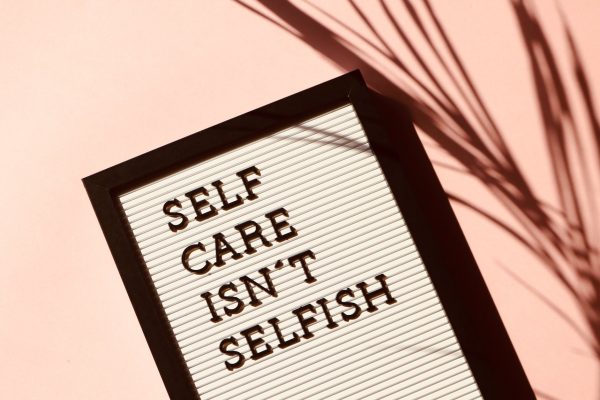The term “self-care” is not a new concept, but just a shortened way to say “taking time for you” or “taking care of yourself”. We use it as an all-encompassing term that means to take care of our mental and physical health to make sure we can be our best selves. However, the self-care movement is often captured by people who use “self-care” to justify self-indulgence, bad habits, and short-term gratification. True self-care comes from establishing long-term routines that improve our overall health!
Healthy: Getting enough rest
Creating a solid sleep routine that gives us 7-8 hours of sleep each night can help us perform better throughout the day. Taking small breaks throughout our day by actually taking our lunches at work, taking 15-minute breaks, and unwinding at the end of the day with something that is mindfully relaxing.
Unhealthy: resting without being mindful
Getting home from work or school and spending the rest of the evening watching tv late into the evening, or mindlessly scrolling our phones until we’re so exhausted that we roll into bed is not true self-care. They are really helpful for short-term gratification and may make us happy at the moment, but they impact our mental health negatively in the long run.
Flicking through our phones creates rapid eye movements from trying to absorb too much information, especially when we’re tired. This makes falling asleep more difficult and results in restless sleep when we finally do drift off. The next morning, it’s harder for us to get out of bed on time – and the altered sleep schedule will roll into the following day.
Try this: Turning off the phone at least an hour before bed and try light reading, yoga, or journaling to disconnect us from the world.
Healthy: dressing in a way that makes us feel good
When we look and feel good during the day, especially when we interact with other people, we feel more confident and more productive. Sometimes presenting ourselves in a way that makes us feel worthy and boosts our self-esteem will make others see us in the same light. It’s important that we find a healthy balance between comfort and outward appearance that helps us put our best foot forward.
Unhealthy: self-indulgent retail therapy
Many of us are guilty of this! Recognizing that shopping for instant gratification that puts us well outside of our budget is not self-care. Despite what makeup and fashion influencers will tell us, constantly purchasing new products that make it harder for us to pay our bills or going into credit card debt will not help us in the long run. This really acts as short-term gratification that doesn’t usually help us in the long run. Even if we can afford to shop obsessively, psychologists consider this a maladaptive coping mechanism, which means we’re spending a lot of time and money on the wrong priorities.
Try this: If we really enjoy a bit of retail therapy, set aside a small monthly budget for fun purchases and stick with it! We all need a pick-me-up, but not if it breaks the bank or becomes an obsession.
Healthy: Making time for friends and family
We all need to set aside a bit of time to socialize with our friends and family, chosen or biological. Spending time nurturing positive relationships that help us grow as people are important whether we live busy lives or tend to enjoy our personal space. Finding friends who are committed to growth and well-being helps us stay on track in our own lives!
Unhealthy: going out all of the time at the expense of personal goals
While it’s healthy to maintain good friendships and let loose once in a while, it becomes unhealthy when it’s the only thing we’re doing. When going out with friends starts to negatively impact work, life, and budget it’s time to take a step back. This is another one of those “maladaptive avoidance” mechanisms psychologists mention, where we spend time socializing to avoid confronting other challenges in our life.
Try this: Some of us are bigger extroverts than others and need a few days of socializing each week vs each month. Setting ourselves a time limit when we want to have a coffee or a glass of wine during the week and limiting ourselves to only one or two hours before we have to head home can make a big difference. Not making plans every weekend helps us to decompress and check in on our goals.
There are many more examples, but they all have a common theme. Self-care is about setting ourselves up for long-term health and happiness by using healthy coping mechanisms, routines, and habits that keep us moving forward. Using short-term gratification, overindulgence, or nihilism (nothing matters anyway so we may as well just *blank*) is not real “self-care” and will not do us any favors in the long run.

